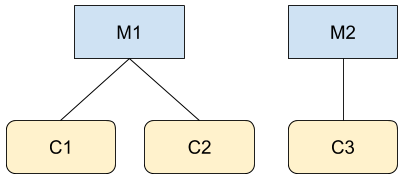Вы можете получить список доступных вам клиентов с помощью метода ListAccessibleCustomers в CustomerService . Однако необходимо понимать, какие клиенты возвращаются в этом запросе.
Список доступных клиентов — один из немногих запросов в API Google Ads, который не требует указания идентификатора клиента, и запрос игнорирует любые предоставленные login-customer-id . Результирующий список клиентов формируется на основе ваших учётных данных OAuth. Запрос возвращает список всех аккаунтов, с которыми вы можете работать напрямую, используя ваши текущие учётные данные. Этот список не обязательно включает все аккаунты в иерархии аккаунтов; он включает только аккаунты, в которые ваш аутентифицированный пользователь был добавлен с правами администратора или другими правами.

Представьте, что вы — пользователь A , являющийся администратором аккаунтов M1 и C3 в двух иерархиях, показанных на рисунке. Если вы обратитесь к API Google Ads, например, к GoogleAdsService , вы сможете получить доступ к информации об аккаунтах M1 , C1 , C2 и C3 . Однако вызов CustomerService.ListAccessibleCustomers вернет только аккаунты M1 и C3 поскольку это единственные аккаунты, к которым у пользователя A есть прямой доступ.
Вот пример кода, иллюстрирующий использование метода CustomerService.ListAccessibleCustomers :
Ява
private void runExample(GoogleAdsClient client) { // Optional: Change credentials to use a different refresh token, to retrieve customers // available for a specific user. // // UserCredentials credentials = // UserCredentials.newBuilder() // .setClientId("INSERT_OAUTH_CLIENT_ID") // .setClientSecret("INSERT_OAUTH_CLIENT_SECRET") // .setRefreshToken("INSERT_REFRESH_TOKEN") // .build(); // // client = client.toBuilder().setCredentials(credentials).build(); try (CustomerServiceClient customerService = client.getLatestVersion().createCustomerServiceClient()) { ListAccessibleCustomersResponse response = customerService.listAccessibleCustomers( ListAccessibleCustomersRequest.newBuilder().build()); System.out.printf("Total results: %d%n", response.getResourceNamesCount()); for (String customerResourceName : response.getResourceNamesList()) { System.out.printf("Customer resource name: %s%n", customerResourceName); } } }
С#
public void Run(GoogleAdsClient client) { // Get the CustomerService. CustomerServiceClient customerService = client.GetService(Services.V23.CustomerService); try { // Retrieve the list of customer resources. string[] customerResourceNames = customerService.ListAccessibleCustomers(); // Display the result. foreach (string customerResourceName in customerResourceNames) { Console.WriteLine( $"Found customer with resource name = '{customerResourceName}'."); } } catch (GoogleAdsException e) { Console.WriteLine("Failure:"); Console.WriteLine($"Message: {e.Message}"); Console.WriteLine($"Failure: {e.Failure}"); Console.WriteLine($"Request ID: {e.RequestId}"); throw; } }
PHP
public static function runExample(GoogleAdsClient $googleAdsClient) { $customerServiceClient = $googleAdsClient->getCustomerServiceClient(); // Issues a request for listing all accessible customers. $accessibleCustomers = $customerServiceClient->listAccessibleCustomers(new ListAccessibleCustomersRequest()); print 'Total results: ' . count($accessibleCustomers->getResourceNames()) . PHP_EOL; // Iterates over all accessible customers' resource names and prints them. foreach ($accessibleCustomers->getResourceNames() as $resourceName) { /** @var string $resourceName */ printf("Customer resource name: '%s'%s", $resourceName, PHP_EOL); } }
Питон
def main(client: GoogleAdsClient) -> None: customer_service: CustomerServiceClient = client.get_service( "CustomerService" ) accessible_customers: ListAccessibleCustomersResponse = ( customer_service.list_accessible_customers() ) result_total: int = len(accessible_customers.resource_names) print(f"Total results: {result_total}") resource_names: List[str] = accessible_customers.resource_names for resource_name in resource_names: # resource_name is implicitly str print(f'Customer resource name: "{resource_name}"')
Руби
def list_accessible_customers() # GoogleAdsClient will read a config file from # ENV['HOME']/google_ads_config.rb when called without parameters client = Google::Ads::GoogleAds::GoogleAdsClient.new accessible_customers = client.service.customer.list_accessible_customers().resource_names accessible_customers.each do |resource_name| puts "Customer resource name: #{resource_name}" end end
Перл
sub list_accessible_customers { my ($api_client) = @_; my $list_accessible_customers_response = $api_client->CustomerService()->list_accessible_customers(); printf "Total results: %d.\n", scalar @{$list_accessible_customers_response->{resourceNames}}; foreach my $resource_name (@{$list_accessible_customers_response->{resourceNames}}) { printf "Customer resource name: '%s'.\n", $resource_name; } return 1; }
завиток
# Returns the resource names of customers directly accessible by the user # authenticating the call. # # Variables: # API_VERSION, # DEVELOPER_TOKEN, # OAUTH2_ACCESS_TOKEN: # See https://developers.google.com/google-ads/api/rest/auth#request_headers # for details. # curl -f --request GET \ "https://googleads.googleapis.com/v${API_VERSION}/customers:listAccessibleCustomers" \ --header "Content-Type: application/json" \ --header "developer-token: ${DEVELOPER_TOKEN}" \ --header "Authorization: Bearer ${OAUTH2_ACCESS_TOKEN}" \
Список аннулированных аккаунтов
API Google Ads не предоставляет прямого способа получить список закрытых аккаунтов в управляющем аккаунте. Однако вы можете воспользоваться следующим обходным решением для получения этого списка.
Получите список
ACTIVEссылок с помощью ресурсаcustomer_client_linkи создайте список клиентов с помощью поляcustomer_client_link.client_customer.SELECT customer_client_link.client_customer, customer_client_link.status FROM customer_client_link WHERE customer_client_link.status = ACTIVEПолучите список
ENABLEDучетных записей с помощью ресурсаcustomer_client.SELECT customer_client.id, customer_client.descriptive_name FROM customer_clientРазница между двумя списками дает вам список аннулированных аккаунтов.

